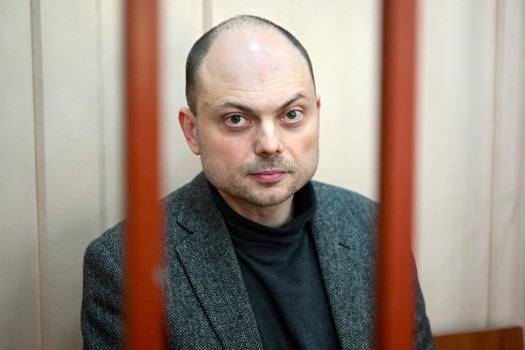
‘Our society will open its eyes and stand in horror’ Vladimir Kara-Murza, charged with treason and facing a 25-year sentence, addresses the court
Мы рассказываем честно не только про войну. Скачайте приложение.
At the conclusion of his trial in Moscow, the Russian opposition politician Vladimir Kara-Murza addressed the court, declining to express “remorse for his misdeeds” or to plead with the judges for mercy. The anti-Putin dissident is charged with disinformation about the Russian military, complicity with an undesirable organization (a charge connected to the political foundation Open Russia), and, finally, with high treason. Based on the accumulated charges, the prosecution has asked the court for a 25-year sentence, despite the fact that, after surviving two poisoning attempts, Kara-Murza suffers from lower-body polyneuropathy, listed as one of the conditions that should legally preclude a person from serving a prison sentence. The politician has been in custody since April 2022. This is the full text of his courtroom statement.
I’d been convinced that, after two decades in Russian politics, and after all I’d seen and experienced myself, nothing could surprise me anymore. I must admit I was wrong. I have been surprised to see that, in the degree of opacity and discrimination against the defense, my 2023 trial leaves the Soviet dissident trials of the 1960s and 1970s in the dust. The requested sentence and the use of words like “enemy” are redolent not of the 1970s, but of the 1930s. As a historian, I see this as a cause for reflection.
At the stage of the defendant’s testimony, the moderator reminded me that expressing “remorse” for my “misdeeds” would be considered an extenuating factor. Although I’m rarely amused these days, I couldn’t help smiling at this. Criminals can express remorse for their misdeeds, but I am in jail because of my political views. I’m here because I’ve spoken against the war in Ukraine; because of my many years of struggling against Putin’s dictatorship; because of my contribution to effecting personal international sanctions against human rights violators under the Magnitsky Act. Not only do I not feel remorseful about any of it, I’m proud of what I’ve done. I’m proud of having come to politics thanks to Boris Nemtsov. I’d like to hope that he isn’t ashamed of me.
I would sign under every word that I’ve ever said and that’s now being used against me. I have only one cause for remorse: that in all my years in politics, I haven’t been able to persuade enough of my compatriots and politicians from democratic countries of the danger presented by the current Kremlin regime to both Russia and the rest of the world. It’s become self-evident by now, but at a terrible price that is war.
An allocution statement is usually a time to plead for an acquittal. For someone who committed no crime, an acquittal is the only lawful outcome in a trial. But I ask this court for nothing. I know my verdict; I knew it even a year ago, when I looked in my rear-view mirror and saw the men in black running after my car. This is the price of non-silence in Russia at present.
But I also know the day will come when the darkness that’s enveloped our country will be dispelled; when people will see something that’s black and call it black, and when they call what’s white white; when it’s officially recognized that two times two equals four; when a war is called a war, and an impostor an impostor; when those who started this war will be called criminals, instead of those who tried to stop it. That day will come just as inevitably as the spring that follows even the most ferocious winter. On that day, our society will open its eyes and stand in horror of the crimes committed in its name. This realization, this consciousness will be the beginning of a long and difficult journey to Russia’s recovery and its return into the company of civilized countries.
Even today, in the darkness that surrounds us, and even sitting in this cage, I love my country and believe in our people. I believe that we can make this journey.
Translated by Anna Razumnaya
(1) What does this mean?
Boris Nemtsov was assassinated in 2015.